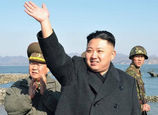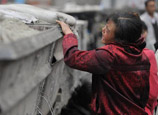
Over the weekend, officials in Beijing announced big plans to streamline several of the Chinese government's ministries and departments, including the much-maligned Ministry of Railways (MOR), which will cede its policymaking and administrative powers to the Ministry of Transport while its commercial responsibilities are to be portioned off into separate units.
The MOR has long been China's poster child of government waste, official corruption and bureaucratic bungling. Largely a leftover from the planned economy era, the powerful ministry was for decades tasked with the dual role of regulating China's rail industry while also being its only commercial player. It isn't hard to see how the MOR's stranglehold on rail transit, combined with a lack of outside oversight, didn't produce conditions where efficiency, innovation and fair dealing flourished.
But does the government's recent fracturing mean that a new day is about to dawn for China's rail industry, as some early reports suggest? Let's not get ahead of ourselves.
For starters, the Ministry of Transport will soon be shouldering the unenviable responsibility of directing China's sprawling rail system, with which it is largely unfamiliar, as well as the regional rail bureaus that oversee its daily operations. Until now, the ministry has kept a fairly low profile running the nation's postal and civil aviation systems as well as China's maritime patrol agency. Over the near-term at least, transport officials may find themselves reliant on current rail authority leaders and established MOR procedures for guidance. This could make for a rough adjustment period as transport officials gain their bearings and rail officials get used to sharing their duties.
Meanwhile, there is little to suggest now that the spin-off of the MOR's commercial entities will make rail transit a better experience for customers. Even though regulators may have less direct involvement in the business side of rail transit, the industry will likely remain monopolized by State-owned enterprises (SOEs) for the foreseeable future.
We've already seen similar processes play out in recent years with China's telecoms, oil and banking industries. The government has long kept these industries under its thumb with policy choices that tilt the game in favor of SOEs despite market reforms, the nominal presence of the private sector and the occasional calls to promote efficiency through more competition.
Can we expect anything different for rail? Only time will tell. Perhaps we may see the eventual emergence of "third sector" operations - for-profit rail lines funded by a mixture of government money and private capital - such as are prominent in Japan and elsewhere, although this could be a long way off considering the lack of private players in China's rolling stock game and concerns about Beijing's unwillingness to relinquish control of the strategically important rail system.
The MOR's impending shake-up is certainly an important first step toward reworking a government organ that many have long described as an ossified remnant from a long-gone era, but obviously there's still a lot of heavy lifting to do before rail transit gets on track. The real test now will be whether officials can deliver on the lofty goals they've set for themselves.
















 How we face 'getting old before getting rich'
How we face 'getting old before getting rich'


![]()
